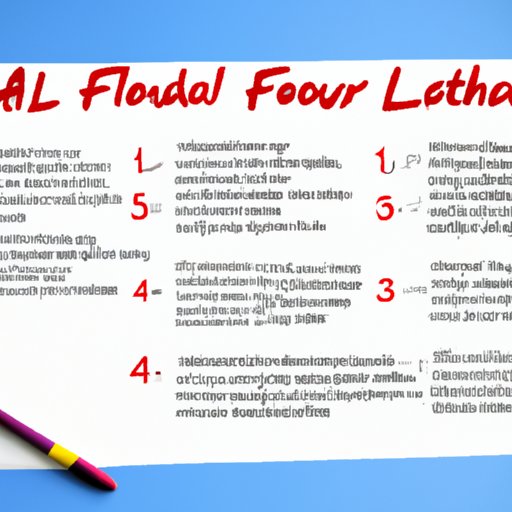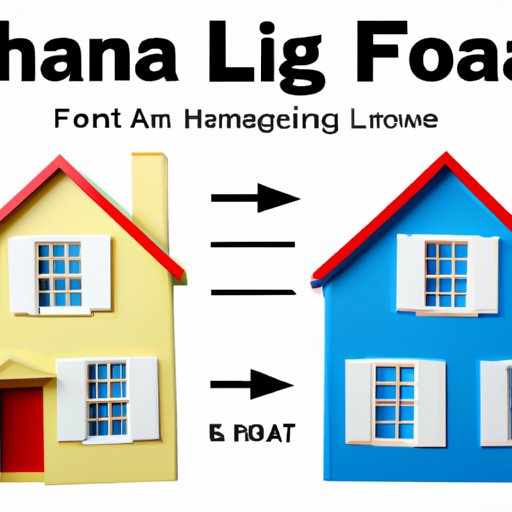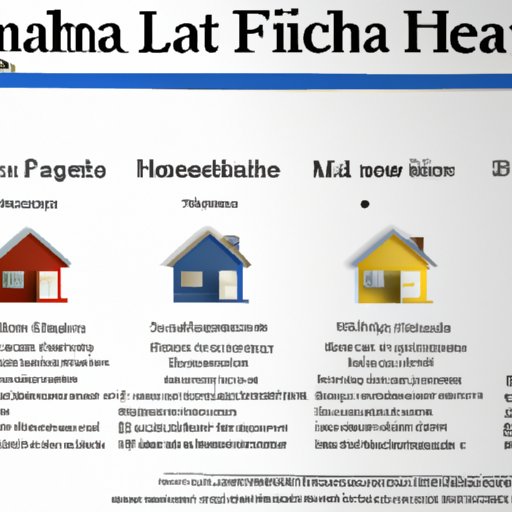Introduction
An FHA loan is a mortgage that is insured by the Federal Housing Administration (FHA). This type of loan is designed to make it easier for homebuyers to purchase a home, as it requires less stringent eligibility requirements than other types of mortgages. In this article, we will provide an overview of how an FHA loan works, who is eligible for one, the different types available, and the steps involved in the application process. We will also compare FHA loans to conventional mortgages and provide tips for applying for an FHA loan.
Explaining the Basics of an FHA Loan
What is an FHA loan? An FHA loan is a mortgage that is insured by the Federal Housing Administration (FHA). The FHA provides insurance for lenders in the event that a borrower defaults on their loan. This type of loan is designed to help homebuyers with limited funds or less-than-perfect credit obtain financing to purchase a home. The FHA does not actually lend money; instead, it insures the loan, providing protection for lenders in the event of default.
Who is eligible for an FHA loan? Generally, any person who meets the basic eligibility requirements can apply for an FHA loan. These requirements include having a valid Social Security number, being of legal age to sign a mortgage in your state, and having a steady source of income. Additionally, borrowers must have a credit score of at least 580 to qualify for an FHA loan. Borrowers with lower credit scores may still be eligible for an FHA loan, but they may have to pay a higher interest rate.
Outlining the Eligibility Requirements for an FHA Loan
In addition to the basic eligibility requirements mentioned above, there are several other requirements that must be met in order to qualify for an FHA loan. These include:
- Credit Score Requirements: Borrowers must have a minimum credit score of 580 in order to qualify for an FHA loan. Borrowers with lower credit scores may still be eligible, but they may have to pay a higher interest rate.
- Down Payment Requirements: Borrowers must put down at least 3.5% of the purchase price of the home as a down payment. Some borrowers may qualify for down payment assistance programs.
- Debt-to-Income Ratio Requirements: Borrowers must have a debt-to-income ratio of 43% or less in order to qualify for an FHA loan. This means that the total amount of monthly debt payments cannot exceed 43% of the borrower’s gross monthly income.
- Document Requirements: Borrowers must provide income documentation, such as pay stubs or tax returns, in order to qualify for an FHA loan. They must also provide proof of employment and residence, as well as other documents as required by the lender.

Describing the Different Types of FHA Loans
There are several different types of FHA loans available. These include:
- Fixed Rate FHA Loan: A fixed rate FHA loan has an interest rate that remains the same throughout the life of the loan. This type of loan is ideal for borrowers who want the security of knowing their monthly payments will remain the same.
- Adjustable Rate FHA Loan: An adjustable rate FHA loan has an interest rate that can change over time. This type of loan is ideal for borrowers who want to take advantage of lower initial interest rates, but are willing to accept the risk of higher payments if interest rates increase.
- Energy Efficient Mortgage: An energy efficient mortgage is a type of FHA loan that allows borrowers to finance energy-efficient home improvements into their mortgage. This type of loan is ideal for borrowers who want to make their home more energy-efficient.
- Refinancing Options: Borrowers who already have an FHA loan may be able to refinance their loan into a new FHA loan with better terms. This type of loan is ideal for borrowers who want to take advantage of lower interest rates or shorter repayment terms.

Discussing the Benefits of an FHA Loan
There are several benefits to obtaining an FHA loan. These include:
- Lower Down Payment: FHA loans require a lower down payment than conventional loans, making them an attractive option for borrowers with limited funds. According to a survey conducted by the National Association of Realtors, the median down payment for first-time homebuyers using FHA loans was just 5% in 2018.
- Lower Closing Costs: FHA loans also typically have lower closing costs than conventional loans. This makes them an attractive option for borrowers who don’t have extra money to cover these costs.
- Easier Qualification Requirements: As mentioned earlier, FHA loans typically have less stringent qualification requirements than conventional loans. This makes them an attractive option for borrowers with less-than-perfect credit or limited funds.

Listing the Steps Involved in the FHA Loan Process
The process of obtaining an FHA loan involves several steps. These include:
- Pre-Approval: Before you begin shopping for a home, it is important to get pre-approved for an FHA loan. This will give you an idea of how much you can borrow and help you narrow down your search.
- Application: After you have chosen a home, you will need to complete an application for an FHA loan. This process involves submitting information about your income, assets, and debts.
- Processing: Once your application has been submitted, it will be processed by the lender. During this step, the lender will review your financial information and determine whether you are eligible for an FHA loan.
- Underwriting: Once your application has been processed, it will be sent to the underwriter. The underwriter will review your application and determine whether you meet the requirements for an FHA loan.
- Closing: If your loan is approved, you will need to attend a closing session. At this session, you will review and sign the final documents and pay any remaining closing costs.

Comparing FHA Loans to Conventional Loans
When deciding which type of loan is best for you, it is important to consider the differences between FHA loans and conventional loans. Here are some of the key differences:
- Eligibility Requirements: As mentioned earlier, FHA loans typically have less stringent eligibility requirements than conventional loans. This makes them an attractive option for borrowers with less-than-perfect credit or limited funds.
- Interest Rates: FHA loans generally have lower interest rates than conventional loans. This makes them an attractive option for borrowers looking to save money on their monthly mortgage payments.
- Down Payment: FHA loans require a lower down payment than conventional loans, making them an attractive option for borrowers with limited funds.
Providing Tips for Applying for an FHA Loan
When applying for an FHA loan, here are a few tips to keep in mind:
- Gather Documentation: Before you apply for an FHA loan, it is important to gather all of the necessary documents, such as pay stubs, tax returns, and bank statements. This will help speed up the process and ensure that your application is complete.
- Shop Around for a Lender: It is important to shop around for a lender when applying for an FHA loan. Different lenders offer different rates and terms, so it is important to compare them before choosing one.
- Review all Terms and Conditions Carefully: Before signing any documents, it is important to read and understand all of the terms and conditions of the loan. Make sure you understand all of the fees, interest rates, and repayment terms before signing.
Conclusion
An FHA loan is a mortgage that is insured by the Federal Housing Administration (FHA). This type of loan is designed to make it easier for homebuyers to purchase a home, as it requires less stringent eligibility requirements than other types of mortgages. In this article, we provided an overview of how an FHA loan works, who is eligible for one, the different types available, and the steps involved in the application process. We also compared FHA loans to conventional mortgages and provided tips for applying for an FHA loan.
The benefits of an FHA loan include a lower down payment, lower closing costs, and easier qualification requirements. However, it is important to remember that FHA loans also come with certain restrictions, such as higher interest rates and stricter eligibility requirements. For this reason, it is important to carefully consider your options before applying for an FHA loan.
(Note: Is this article not meeting your expectations? Do you have knowledge or insights to share? Unlock new opportunities and expand your reach by joining our authors team. Click Registration to join us and share your expertise with our readers.)
